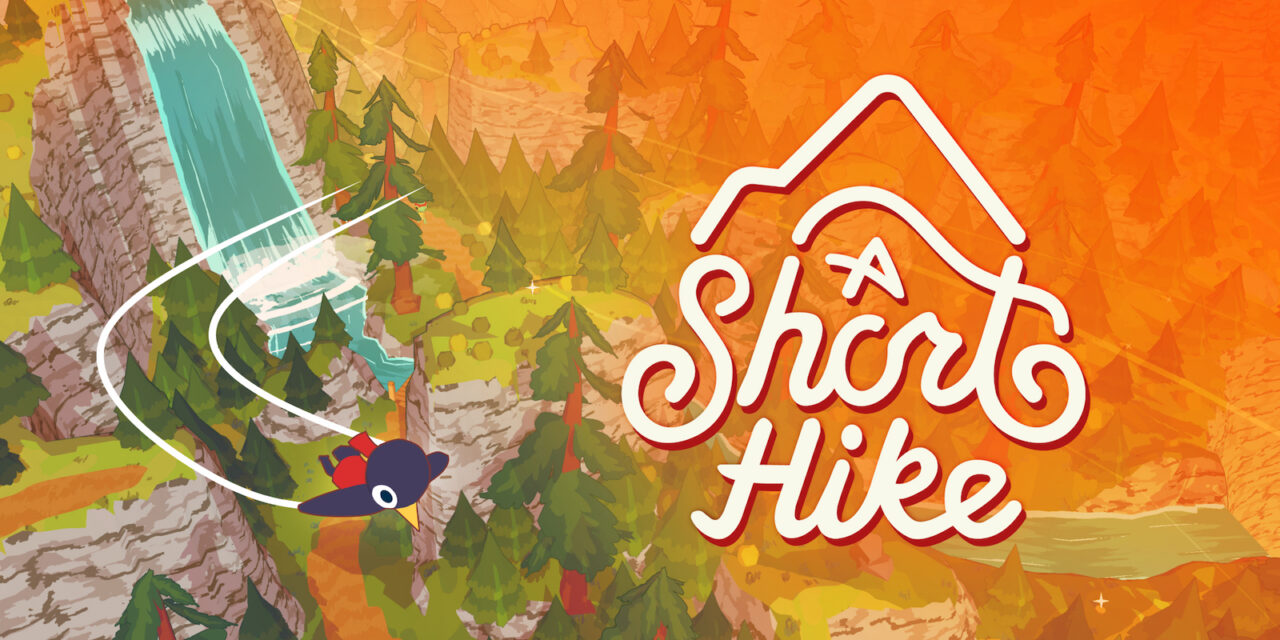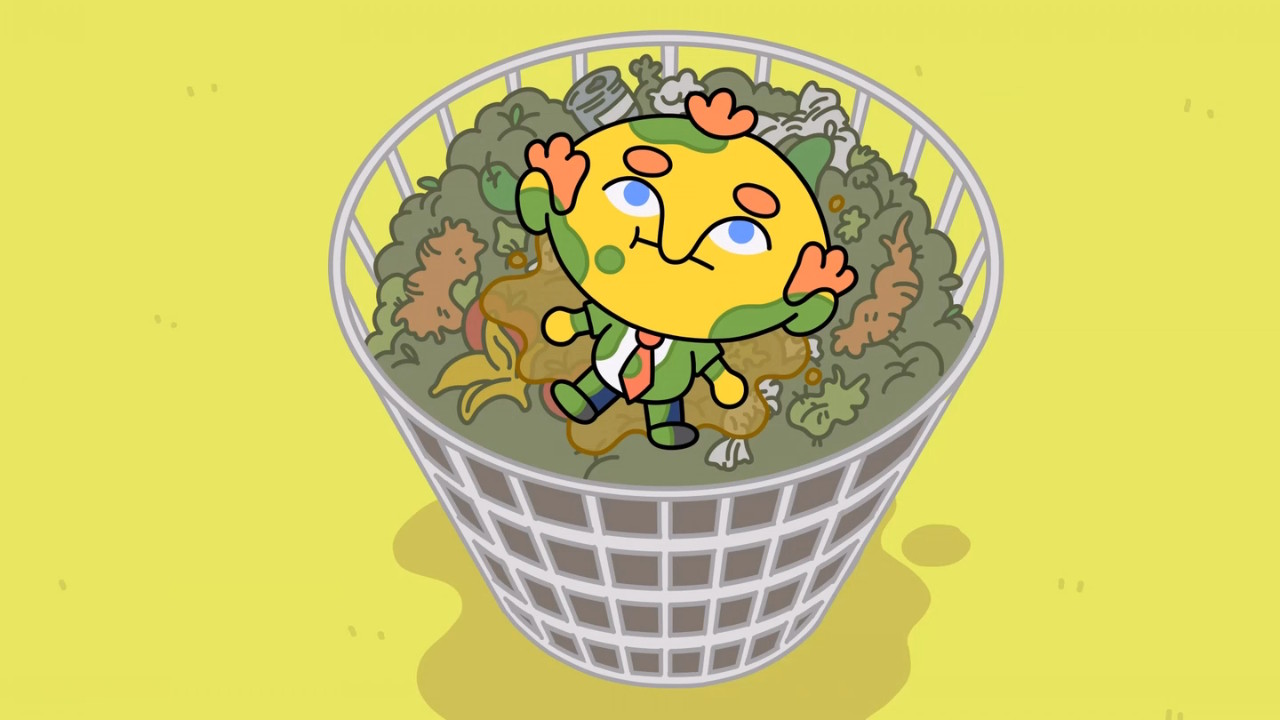I’ll never forget the first time I played A Short Hike. It was the first game I got on itchi.io in June 2020, and as you might remember, there was a lot going on during that time.
I had lost my job; the pandemic was escalating faster and faster. This is the game that caught my attention immediately. I had no clue what my next step was going to be, and where I should even go, and I had never felt more lost. It was the game’s graphics that caught my eye, something that invoked Animal Crossing but on a 2.5D plane.
I think Animal Crossing is what I expected walking in, or at least a more lo-fi version of it. Talking animals, a peaceful village, all of that sounded great. I had already played my way through the latest entry of that series over the past few months and I was expecting more of the same.
A Short Hike is not, in fact, an Animal Crossing clone despite the visuals they have in common. Animal Crossing focuses more on the day to day of building your village (or island) and getting to know your neighbors. A Short Hike has no relationships to develop past pre-determined points. In its own way, that becomes one of its biggest strengths.
A Short Hike wants to immerse you in a setting at your own pace, slowly untangling the story of these animals and a place that draws multiple generations together through the years. It wants you to engage as much or as little as you want. Though it takes only a couple of hours to “beat,” it makes the case for why a shorter game can be a meaningful one.
Wide as a puddle, deep as an ocean
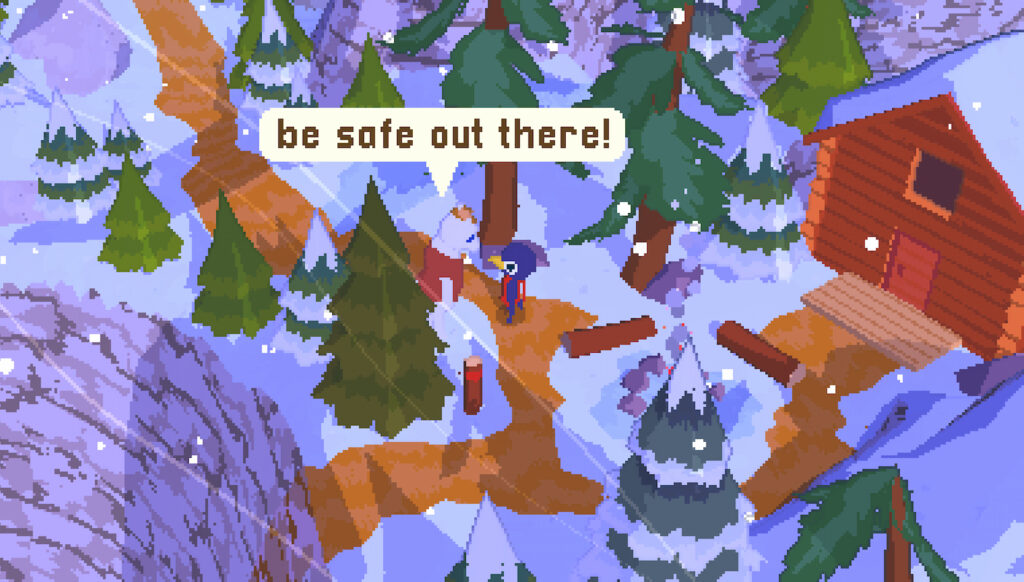
That phrase is usually used in reverse to describe many open-world games. Normally, you hear the phrase “wide as an ocean, deep as a puddle” to describe many open-world games. The game world is massive, but the minute you try digging into it even a little, there isn’t very much to do. Objectives are littered all over the map, but those quests are nearly identical to one another.
There are exceptions to this rule, like Breath of the Wild, for instance. There are many open-world games that fully utilize it for the sake of the player. A Short Hike is maybe a strange game to describe as “open-world,” since that world can be traversed in several minutes.
You play as Claire, a bird traveling to Hawk Peak with her Aunt May for the very first time, in what seems to be a long family tradition. She’s really missing her mother, who goes unnamed, who wasn’t able to go with them. As she quests for the top of Hawk Peak to get the phone signal she needs to talk to her mother, she runs into a variety of critters who all need help around this lo-fi world. Her main tool in this quest is Golden Feathers, which help her glide and leap farther across the mountain.
With enough of its Golden Feathers, you can hop and soar across mountains, forests, and rivers in a matter of seconds. The game does have an optional speed-run mode you can switch on any time you want (I admittedly did not use this feature playing it this time around), but it also allows you to take your time and let the immersive soundscape wash over you.
My first playthrough, back in June 2020, was one where I tried to play it the way I played everything. I optimized my approach, collected as much as I could find and rushed through dialogue as fast as possible to get to the end. I did not take my time with the game. I did not recognize that this was how I played games back in the day.
There is no time limit to the game, and no one admonishes you for taking extra time to find them a shovel or their lucky headband. The animals of this world are infinitely more patient than the Animal Crossing villagers, who admonish and shame you if you spend even one second too long away from them.
Playing it again this year, something in me clicked, and I decided to take my time with it instead of rushing from area to area. I noticed how neatly each area flowed into the next, where each intersection let you access multiple zones at the same time. You can, without too much trouble, wander around and find enough Golden Feathers to make it to the top of Hawk Peak, and then complete all the other objectives.
A Short Hike wants you to be able to memorize the topography of its setting. It begins to feel like the way you memorize the streets and landmarks around where you live or where you grew up. Having lived in the same apartment for the past five years, I will always know how to get to the nearest creek a good couple miles away. I’ve been going so often that I can do it from memory now that it’s been so long.
A Short Hike starts to feel the same way. Its fetch quests and collectibles seek to create that kind of muscle memory in you, too. The rewards for completing these quests are often far smaller in scope than what we’re used to.
A Short Hike to the mountaintop
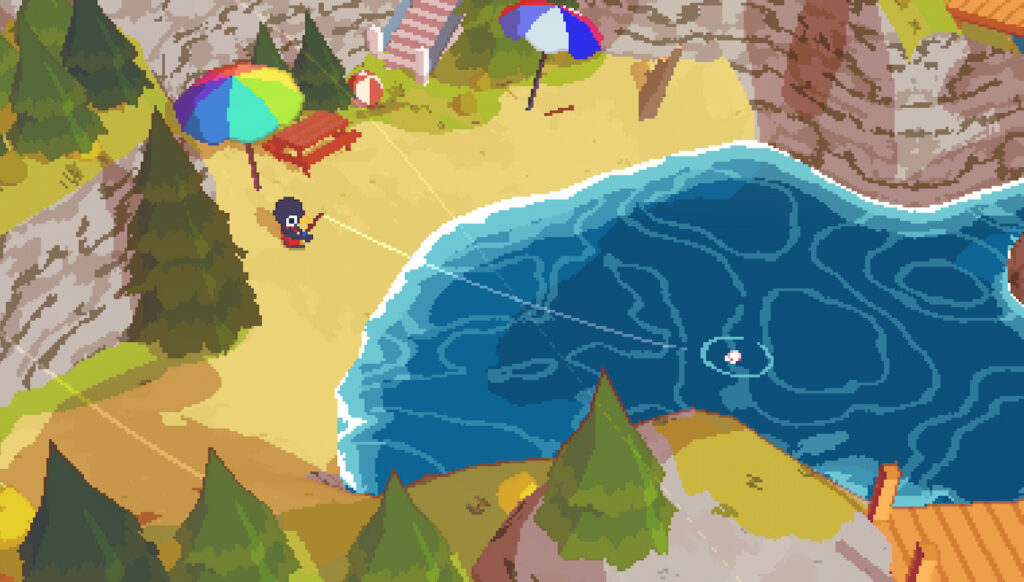
This first clicked for me when I ended up playing two quests I had completely missed on my first playthrough five years earlier. I had decided to wander around a forest close by to Hawk Peak, where I was supposed to be climbing. I let the ambient sounds of the forest wash over me, noting how much they sounded like the parks and rivers I had spent so much time around when I was a kid.
In the back of this forest is a single camper hidden by the trees. If you’re not careful, you will completely walk by this person. This camper becomes briefly worried that you, Claire the bird, will punish them in some way for camping without a permit.
Claire reassures them that she doesn’t plan to do anything like that. The camper thanks Claire for her discretion and asks her to keep a lookout for the permit, which was somehow swallowed by a fish.
There are so many conversations like this, which are whimsical and delightful, that I fully expected this to just be another quirky conversation with an NPC. It’s a little thing, a thing that means next to nothing in the grand scheme of things. You can head to Hawk Peak and finish the climb and never think about it again. What I did instead was wander some more.
I found my way to a dock and a bridge, where I found another resident (a walrus) who decided on the spot to teach me how to fish. I had already collected some bait from the various chests lying all around the map, and now was a perfect time to use it. For a split second, I think about rushing to the peak again to finish the climb, whether I’ve got enough Golden Feathers or not. I think better of it, I sit down by the bridge with the fisherman (fisher-animal?), and cast out my rod.
The first couple of times I catch a fish, I get to unlock a new kind of fish in an itemized list, which is the closest the game feels to Animal Crossing. The third time is when Claire realizes that she’s accidentally caught the fish with the camper’s lost permit stuck in its mouth. I had completely forgotten about this. I actually burst out laughing.
A lot of other games would have had a marker directing me right to where I need to go in order to complete this quest. You don’t get any reward from the camper except for more bait to catch more fish. Now, sure, this is hardly the first game to not hold your hand as far as quests are concerned. It veers into the realm of visual novels, so that these simple conversations feel like natural extensions of the world that Claire exists in.
Is this a deeply convoluted plot that requires entire written notebooks to understand? Not at all. I still found myself completely taken away by something as simple as a camping permit and how you could find it.
Flying on your own path
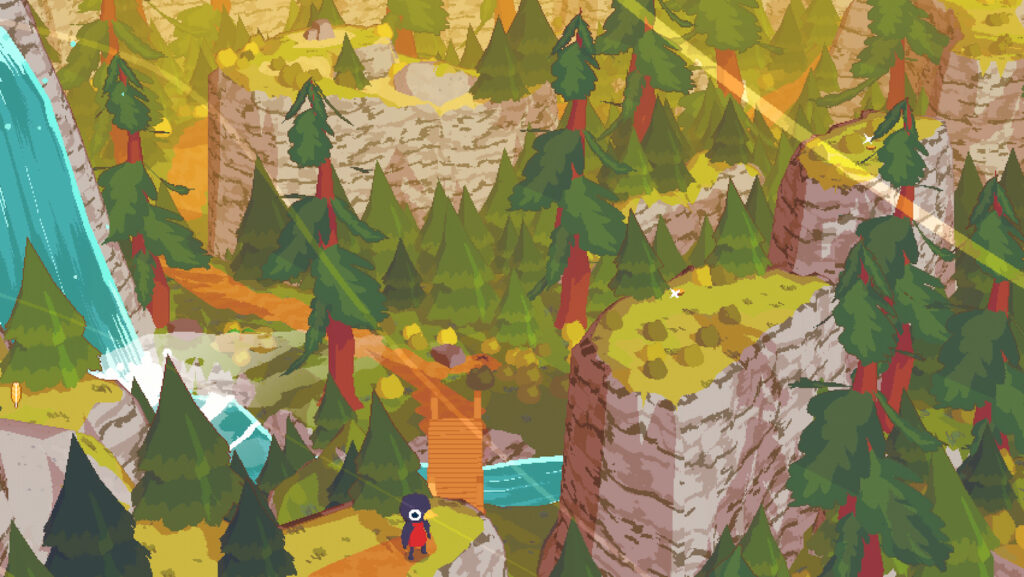
It’s not until the end that we finally learn why Claire’s mother couldn’t go with them to Hawk Peak. Claire finally calls her mother to reveal that she has just gotten out of surgery to treat an unspecified illness. That’s essentially all there is, and this is not revealed until the very end of the game.
Even though this is a story with this tension lying underneath it, it doesn’t get in the way of being able to frolic in nature as much as you want. You can fish as much as you want, you can run and climb and glide as much as you want.
I found that getting enough Golden Feathers on my own let me swoop around the entire map. None of these systems or mechanics are new, but it’s how they come together that feels novel.
One thing that I did find interesting was how much this game relies on verticality to get most of its mechanics across. You do not have full control of the camera in the way you do in other games, and it often slowly moves on its own to help show you other paths you can take. These movements feel very seamless, almost like flipping through a storybook.
There are many games like Yoshi’s Island or Kirby’s Epic Yarn that replicate the aesthetic of a storybook, but they often do so in a very literal way. In the moments where the game softly shows you the full scale of Hawk Peak, it feels like a much more family-friendly version of games like Ico or Shadow of the Colossus, where the scale of the setting lends itself to greater immersion.
Going back to the story about the fish and the permit, part of what draws you into a story that is that simple and uncomplicated is that immersion. You hear the forest and the trees and the critters all around. The camera slowly swoops and slides around. The soundtrack subtly shifts based on which part of the map you’re in.
While Breath of the Wild and games like it did very similar things, I think this drew me in even more because there is a far smaller setting to play with, and thus more specificity that can be used. This, as mentioned, is why the phrase that comes to mind for this game is “wide as a puddle, deep as an ocean.”
It has the opposite effect we see in so many open worlds, where it’s a world where every square inch of it has a personal touch. It feels like the fully realized version of so many games I played as a kid on older consoles, that didn’t yet have the graphical fidelity to be fully animated like this.
Conclusion
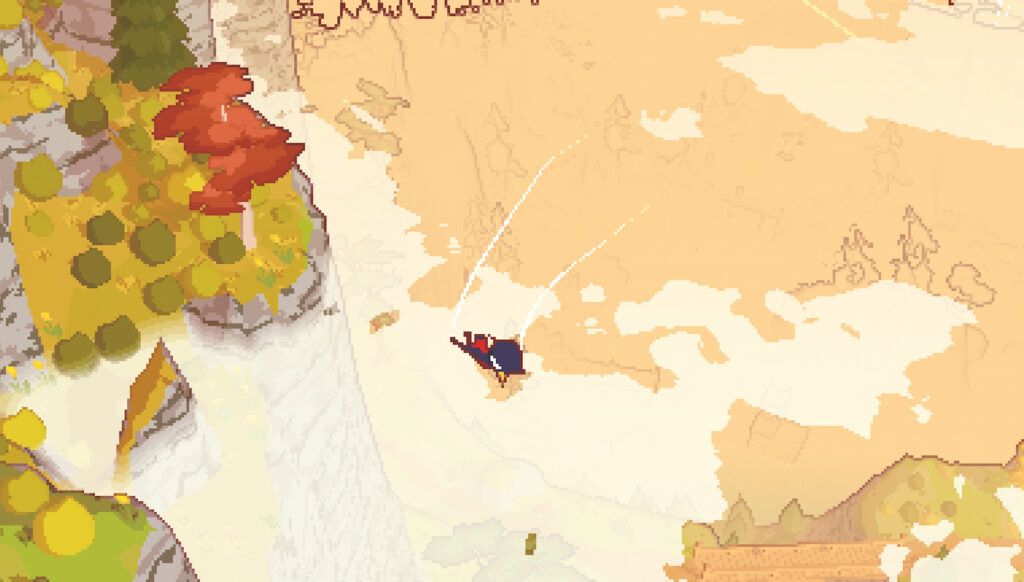
That this game was developed by only five people is genuinely astonishing, given how smoothly it runs. It integrates its sounds and visuals so succinctly that you’re immediately drawn in, and its map is always giving you easy access to all locations with a few short jumps.
It lets you trust your own memory to develop a feel for where you want to go. Coming back to it again and taking more of my time with it turned it from a game where I felt the need to challenge myself to a game I could feel fully cozy in.
While you’re here, check out our original review of A Short Hike. You can pick up the game now on Steam for $4.39 (45% off during the Autumn Sale!) and on itch.io for $7.99.

